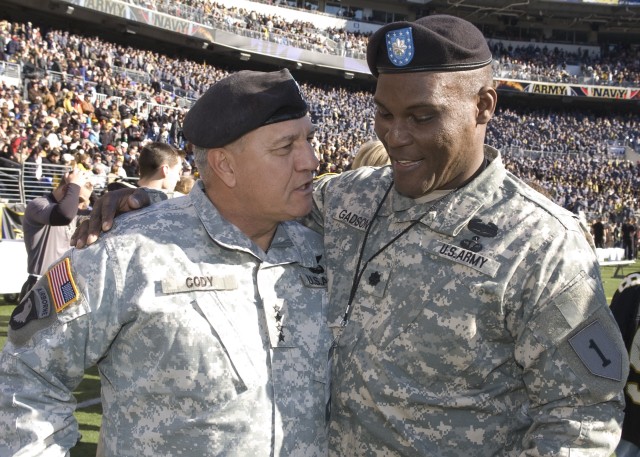WASHINGTON (Army News Service, Dec. 5, 2007) - A former West Point football player who was wounded in action joined the Army's top brass for the coin toss at Saturday's Army-Navy Game in Baltimore.
Still learning to walk after an improvised-explosive device in Baghdad claimed both of his legs in May, Lt. Col. Greg Gadson marched onto the playing field, and he said it reminded him of the three times Army beat Navy when he was a player.
"You could feel the specialness of the game, you could feel the energy in the crowd. It did bring back memories of being a player," he said. "I think especially for a senior, who knows this is his last game, and you're part of a tradition and it's pretty awesome.
"I really was honored to go out there with some of the senior leaders in the Army and accompany them. It was an honor and a privilege that they afforded me and I was so appreciative. At the end of the day, it's a game, but those guys who are out there are going to be leaders in the Army and the Navy and the Marines in a short year and there's going to be a different set of stakes that they're playing for," he added.
A field artillery officer, Lt. Col. Gadson attended West Point so he could play football, but fell in love with the Army, so much so that he decided to remain a Soldier in spite of his injuries.
"I believe I still have something to offer the Soldiers. That's as simple as I can say it. I love being a Soldier and right now I think I still have something to offer. As long as that's the case, I'm up for still being a Soldier," he said.
Deployed with the 2nd Battalion, 32nd Field Artillery, Lt. Col. Gadson remembers the blast and thinking he didn't have his rifle. He remembers his first sergeant resuscitating him as he almost bled to death - he needed 70 pints of blood that first night alone - and he remembers hearing the helicopter coming to evacuate him, but little else until weeks later in Walter Reed Army Medical Center.
Doctors had to amputate his left leg after infection caused his arteries to collapse. They were able to save his right leg, but Lt. Col. Gadson and his wife decided his quality of life would be better without it. He said his healing sped up very quickly after it was gone and he was finally able to leave intensive care. His right arm was also badly damaged and he needs at least two more surgeries in the next year. He still goes to Walter Reed for therapy every day.
Although his injuries and recovery have, of course, been tough on his family, Lt. Col. Gadson said that they have ultimately brought his family closer together.
"It's changed their life," he said. "But I think it's also brought us together. In tough times, there's really two ways to go, you can come together or you can go apart and I think it's been something that has brought us together. I am so proud of my kids because they have really embraced what has happened to our family."
Learning to walk without knees or ankles has been challenging, but Lt. Col. Gadson credits prosthetics and the excellent therapists at Walter Reed, and looks at it like training for anything else.
"It's tough, but so is basic training, so is going through West Point, so is war. If you understand that what you're going through is going to be tough, then you prepare yourself for it and you go through it. There's no shortcuts," he said.
Committing to walk on the field at the Army-Navy Game was also a good goal for Lt. Col. Gadson to work towards.
"Once I committed to it I said, 'Well, I have to make sure I can walk,'" he said.
He pushes himself, but he warns wounded Soldiers against pushing themselves too hard and trying to do anything before their bodies are ready.
"Just be patient and realize that you have had a significant event that's happened to you and take your time," he said. "I've found that that's really one of the most challenging things, to really be patient, kind of listen to my body. I'm not the same guy I was and if I push too hard I can do something to hurt myself and that's what I mean about being patient."
Lt. Col. Gadson also wants Soldiers to know that the Army will take care of them.
"One thing I'm really proud of is how the Army has responded to me," he said. "As a commander, you put so much into trying to take care of Soldiers. And I found myself on the other end of being taken care of and it's been absolutely phenomenal.
"I just have to say that (Army medical personnel) are performing phenomenally. The tremendous trauma that my body's been through, I have nothing but great things to say. In other wars, I wouldn't have survived. The fact that three to five months after this happened, I'm in prosthetic limbs and I'm starting to learn how to walk again, is even hard for me to appreciate. These guys have really, really been doing some super work."




Social Sharing